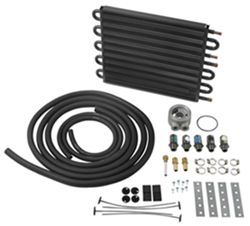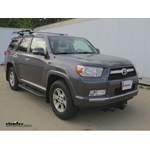
How to Reduce Engine Oil and Transmission Fluid Temperatures While Towing with a 2013 Ford F-150
Question:
hi I have a 2014 ford f150 fx4. it is overheating when towing. Ford states there are no issue or it is normal. Ive flushed my radiator, and transmission, ect. would it help to put your transmission cooler and oil cooler? Or will my engine temp still be high. my transmission will get 225 sometimes. Isnt it all connected in someway? I also dont want worry about it being to cold here in Idaho as some people say. climbing his is my issue and im under the trucks towing capacity. it looks to me your system is plug and play. I also chipped it for towing to see if I might help the engine. sorry for the long story but looking for some answers. thank you. Tim
asked by: Tim
Expert Reply:
When towing a trailer, the vehicle will be working twice as hard as opposed to normal driving conditions and even more so when climbing a hill. The added workload is going to cause a buildup of heat which would affect both performance and wear lift. If the vehicle is as you put "overheating" and you are within the towing capacity of your truck, there is a problem in the cooling/oiling system and you will need to take the vehicle to a shop to have it looked over. However, if the vehicle is just running hot then this is not unheard of when towing a heavy trailer.
In order to help cool both the vehicle's engine oil and transmission fluid, I would recommend using the Derale Combination Transmission and Engine Oil Cooler part # D15902 on your 2013 Ford F-150 FX4. This will be an essential piece of equipment for towing and will help to bring down both the engine oil and transmission fluid temperatures. The kit is easy to install with basic tools and a bit of mechanical aptitude but I would not say it is plug and play. If you need further help you can reference the attached install video on a similar vehicle.

Product Page this Question was Asked From
Derale Combination Transmission and Engine Oil Cooler with Multiple Threads
- Transmission Coolers
- Transmission and Engine Cooler
- Standard Mount
- 17W x 12-1/2T x 3/4D Inch
- With 11/32 Inch Hose Barb Inlets
- Derale
more information >
Featured Help Information
Instructions
Miscellaneous Media

Continue Researching
- Shop: Trailer Hitch
- Shop: Transmission Cooler
- Shop: Derale Combination Transmission and Engine Oil Cooler with Multiple Threads
- Shop: Flex-a-lite Auxiliary Engine Oil Cooler Kit
- Search Results: 15902
- Search Results: oil coolers
- Shop: RV Camera
- Shop: Curt MV Weight Distribution System w/ Friction Sway Control - Round Bar - 14K GTW, 1.4K TW
- Shop: Draw-Tite Ultra Frame Trailer Hitch Receiver w/ Cast Center - Custom Fit - Class V - 2"
- Shop: Hopkins Level+Plus Trailer Level with Memory
- Shop: CIPA Custom Towing Mirrors - Slip On - Driver Side and Passenger Side
- Shop: Hopkins Graduated RV Levels - Stick-on - Qty 2
- Video: Hopkins Graduated RV Levels Review
- Video: Best 2012 Ram 1500 Towing Mirror Options
- Video: K-Source Snap and Zap Driver and Passenger Towing Mirror Review
- Video: Review of Hopkins Tools - 90 Degree Swing Out Level - HM05515
- Search Results: towing mirrors
- Shop: Towing Mirrors
- Shop: Replacement Mirrors
- Shop: Suspension Enhancement
- Search Results: shocks
- Search Results: shock absorbers
- Search Results: load leveling systems
- Search Results: 75232
- Q&A: How to Determine Transmission Return Line for Installing Cooler on Ford F-150
- Q&A: Does Sandwich Adapter of Derale Combination Transmission and Engine Oil Cooler Have Thermostat
- Shop: Performance Chip Tuners
- Video: Furrion Vision S Wireless RV Backup Camera with Night Vision Installation - 2019 Keystone Cougar Fif
- Article: Performance Chips and Modules
- Q&A: What do the Class Ratings Mean on the Transmission Cooler Pages





